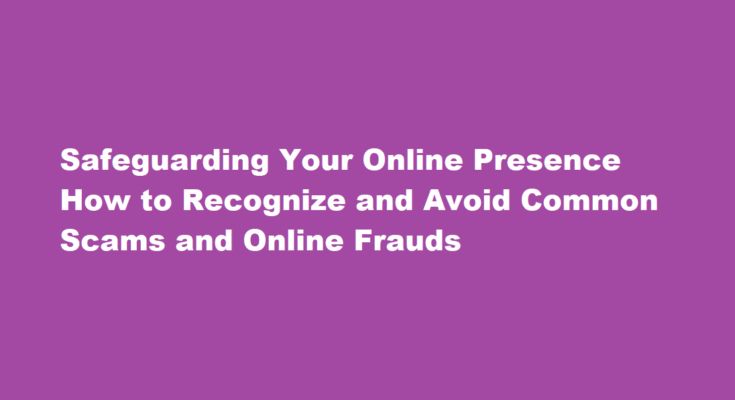Introduction
In today’s digital age, the internet has become an integral part of our lives, connecting us with friends, family, and opportunities around the world. However, this vast online landscape also attracts malicious individuals seeking to exploit unsuspecting users through scams and online frauds. Recognizing and avoiding these pitfalls is essential to safeguarding our personal and financial information. This article aims to educate readers on the most prevalent scams and frauds and equip them with the knowledge to protect themselves online.
Phishing Scams
Phishing scams are one of the most common online frauds. Scammers pose as legitimate entities, such as banks, social media platforms, or government agencies, sending convincing emails or messages to trick users into revealing sensitive information like passwords, credit card details, or social security numbers. To avoid falling victim to phishing scams, never click on suspicious links or provide personal information through unsolicited emails or messages. Always verify the sender’s identity and use two-factor authentication whenever possible.
Online Shopping Fraud
With the rise of e-commerce, online shopping fraud has become prevalent. Fraudsters set up fake websites offering enticing deals on popular products, only to steal payment information from unsuspecting customers. To avoid this, always purchase from reputable and well-known online stores. Check for secure connections (look for “https” and a padlock icon in the address bar) and use credit cards instead of debit cards for added protection.
Tech Support Scams
Tech support scams involve fraudsters posing as tech support representatives from renowned companies. They claim that your computer has issues and request remote access, enabling them to install malware or steal sensitive data. To avoid falling for this scam, remember that legitimate tech support companies won’t contact you out of the blue. Never give remote access to unsolicited callers, and only contact official support channels directly.
Lottery and Prize Scams
Lottery and prize scams often arrive via email or text, congratulating you on winning a substantial prize but asking for a payment to claim it. Remember, if you haven’t entered a contest, it’s highly unlikely you’ve won anything. Legitimate lotteries and contests never ask for payment to receive winnings. Stay cautious and report such messages to the appropriate authorities.
Investment and Ponzi Schemes
Be wary of investment opportunities promising high returns with little or no risk. Many fraudsters use pyramid or Ponzi schemes, using funds from new investors to pay old investors, creating an illusion of profitability. Always research investment opportunities thoroughly, seek advice from trusted financial advisors, and be skeptical of “get-rich-quick” schemes.
Social Engineering
Social engineering scams rely on manipulating human psychology rather than technical exploits. Fraudsters may impersonate friends or colleagues to gain trust or exploit personal information shared on social media. Be cautious about the information you share publicly and verify the identity of individuals requesting personal details.
Romance Scams
In romance scams, fraudsters create fake profiles on dating websites or social media, building emotional connections with victims before requesting money or personal information. Be cautious when engaging with individuals online, especially if they request money or financial assistance.
Employment Scams
Job seekers should be wary of fake job postings that request upfront fees or personal information. Legitimate employers do not ask for money to secure a job or for sensitive details before the hiring process.
FREQUENTLY ASKED QUESTIONS
How are most frauds detected?
An anonymous tip line (or website or hotline) is one of the most effective ways to detect fraud in organizations.
What are common scams online?
One of the most prevalent and successful online scams is phishing. This involves the scammer luring you into providing them with personal information, such as credit card numbers, Social Security numbers, or other sensitive information they can use to make purchases, steal your identity, or more.
Conclusion
Navigating the digital realm safely requires awareness and caution. By staying informed about common scams and online frauds, you can protect yourself and your loved ones from falling victim to these malicious practices. Always be skeptical of unsolicited requests for personal information, double-check the legitimacy of websites and companies, and stay updated on the latest cybersecurity best practices. By fostering a proactive and security-conscious mindset, you can enjoy the benefits of the internet without compromising your safety and privacy.
Read Also : A Comprehensive Guide on Applying for a Student Loan



